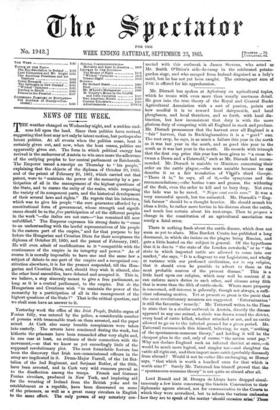Mr. Disraeli has spoken at Aylesbury on agricultural topics, which
he treats with even more than usually unctuous detaiL He goes into the true theory of the Royal and Central Bucks Agricultural Association with a sort of passion, points out how needful it is to reward local dairymaids, and local ploughmen, and local thatchers, and so forth, with local dis- tinction, but how inconsistent that duty is with the more glorious duty of competing with all England in stock and produce. Mr. Disraeli pronounces that the harvest over all England is a "fair" harvest, that in Buckinghamshire it is a " good " one. The root crop, he says, is as much a failure this year in the north as it was last year in the south, and as good this year in the south as it was last year in the north. He records with triumph that the first cup prize this year has been given to "a cross be- tween a Down and a Cotswold," such as Mr. Disraeli had recom- mended. Mr. Disraeli is amiable to Ministers concerning their order on the cattle plague,—the more amiable because he can describe it as a fair translation of VVil's third Georgic. "There it is," he says, all of it,—the symptoms and the recommendations ;—the bovine tears and groans, the withering of the flesh, even the order to kill and to bury deep. Not even the hide was to be saved. " Neque erat coriis uses." It was a very successful speech, but too animated. Mr. Disraeli's "Eng- lish farmer" should be a thought heavier. He should munch his ideas a little, be rather more bovine in his distress about the cattle, and much less certain about his root-crops. Then to propose a change in the constitution of an agricultural association was surely a fatal error.






























